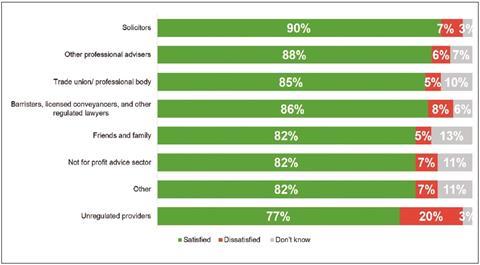
Last week saw publication of the biggest ever survey of legal needs in England and Wales, commissioned by the Law Society and umbrella regulator the Legal Services Board. Based on data collected by YouGov in February and March 2019, it collates the perceptions and experiences of 28,633 people. It is also the first study in this jurisdiction to use OECD guidance on how to develop legal needs surveys, profiling the population by income and how well consumers are equipped to make informed procurement decisions.
-
64% of adults have experienced at least one legal issue in the past 4 years

- 53% had a contentious legal issue
- 27% had a non-contentious legal issue
Approx. 29.8 million people in England and Wales
Amid a 150-page blizzard of percentages and graphics, there is much for the solicitors profession to be cautiously pleased about.
A headline finding is that solicitors score highest for service satisfaction. Nine out of 10 people who had used a solicitor were satisfied with the service they received, while 84% thought the solicitor provided value for money.
Unregulated providers received the worst ratings, with one in five people dissatisfied with the service they received from sources including will-writers and McKenzie Friends.
Overall, two in three people had experienced a legal issue in the previous four-year period surveyed, with most issues (53%) contentious in nature. Most common were issues relating to a professional or defective good/service (26%), anti-social behaviour by neighbours (14%), buying or selling property (11%), wills (11%) and employment (11%).
‘A cornerstone of justice’

‘The findings show when people do get professional legal advice – particularly from a solicitor – they are more able to resolve legal problems effectively, and far more likely to view the justice system as fair, even if they lose their case.
‘While most people resolve minor legal issues – such as faulty goods or parking fines – without professional advice, it is a cornerstone of justice that everyone should be able to get professional legal advice when they need it, regardless of wealth or status.
‘However, legal aid has been decimated by swingeing cuts. This survey shows near unequivocal support for legal aid, but as people do not understand which issues are
covered or if they are eligible, many who should have publicly funded legal advice simply will not get it.
‘Our future justice system should be one that prioritises public legal education so people understand their rights, legal issues and how to access justice.
‘The Law Society believes in evidence-based policy-making. We hope the results of this survey, co-commissioned with the oversight regulator the LSB, will help legal service providers and government better understand and serve the legal needs of the public.’
Simon Davis, president of the Law Society
Solicitors were most likely to be consumers’ main advisers (30%, rising to 40% for contentious issues). Doctors, combined with law centres, not-for-profit sources and Citizens Advice equated to 32%.
A less congenial finding is that old people are much more likely to use a solicitor. Four out of 10 people aged 65 or over reported that a solicitor was their main adviser, declining sharply to 26% in the 30-49 bracket and just 18% of those aged 18-29. Younger people are more likely to seek informal help.
What solicitors do
So what do people go to solicitors for? Most commonly, as one might expect, wills, trusts, probate, residential conveyancing and family issues. The not-for-profit sector is more popular for construction and planning issues, employment, finance and welfare benefits. Advisers other than solicitors and barristers score highly on personal injury and residential conveyancing.
Most people who obtained help from a main adviser did not personally pay for it. Most commonly those who did not pay obtained advice through a free service (49%), while 7% were subsequently funded by an insurance company, or friends and family.
Only one in five people who received professional advice – rising to one in three who paid for a ‘main’ adviser – ‘shopped around’. Those who did not said they were happy with the first service they received, trusted a recommendation or found the matter fairly simple.
However, most people whose main adviser was a solicitor compared the services of two or more providers (57%), with one in 10 comparing four or more services.
Again, though, age is a telling factor. One in five under-30s obtained details of four or more services overall, compared with just 6% of people over 65.
The survey was conducted within three months of new price transparency requirements taking effect, via the Solicitors Regulation Authority in the case of solicitors. So it is probably inappropriate to read too much into the report’s findings on sensitivity to price.
The most commonly experienced legal issues
- Issue with a defective good/ service or professional (26%)
- Anti-social behaviour by neighbours (14%)
- Buying or selling a property (11%)
- Making or changing a will (11%)
- Employment issue (11%)
Upfront about price
Solicitors should take note, however, that being transparent and upfront about prices is associated with higher levels of satisfaction. People who got information about prices when communicating with their main adviser were more likely to be satisfied than those who did not. Where that main adviser was a solicitor, people were more likely than average to report that they only researched the price of one adviser when making a choice.
Those using a solicitor as their main adviser were also more likely to report difficulty in searching for prices – but in addition to the transparency requirements taking effect at the very end of the four-year period surveyed, further context is important. People using a solicitor were more likely to have been dealing with relatively complex issues for which a standardised price was difficult to supply.
In any event, the main reasons for dissatisfaction with a service did not relate to price, but rather a feeling that the adviser did not do enough (32%) or that they took too long (31%).
Among the minority of people who reported being dissatisfied with the services they received across all providers, four out of 10 were ‘silent sufferers’ – that is, they did nothing about it. This included nearly half of people who felt justice was not accessible to them.
Legal aid has been decimated. This survey shows near unequivocal support for legal aid, but as people do not understand which issues are covered or if they are eligible, many who should have publicly funded legal advice simply will not get it
Legal capability
Incidences of resignation or perceived impotence reflect the report’s broader finding that legal capability strongly influences outcomes – pointing to the need for better legal education. People with low legal ‘confidence’ (and income) had less understanding of their rights, were less likely to seek professional help and ended up less satisfied with whatever service they did receive.
There is ample reason to suppose that these lacunae will have led to worryingly sub-optimal outcomes. Consider legal aid. Nine in 10 adults agreed legal aid is a ‘good thing’ and most feel it should be available for domestic violence and unfair police treatment. (They were, however, markedly less enthusiastic about legal aid for welfare benefits issues (backed by a bare majority of 53%) and relationship breakdown (52%).)
Despite this general endorsement, among people responding about a legal issue eligible for legal aid who had a household income of £32,000 or less, some 85% did not think they were eligible. Moreover, people with high legal confidence were more likely to say they understood their rights and responsibilities when their contentious issue first started than those with low confidence.

Lower legal confidence
Academic profiling used in the study shows that more than a third of all adults have lower legal confidence and ‘self-efficacy’. People with low legal capability were less likely to get professional help, more likely to think obtaining help would have been more expensive, and experienced more difficulty in searching for information.
This is turn has potentially concerning implications for consumer welfare in an environment where the Legal Services Board and the front-line regulators continue to push for further liberalisation of the market. Nearly half of all people
do not know what a regulated legal service is. Even worse, one in three who used a ‘main adviser’ did not know or check whether their adviser was regulated when dealing with a contentious issue – most said they simply assumed the adviser was regulated.
Legal Needs of Individuals in England and Wales. See www.lawsociety.org.uk/legal-needs-survey-2020/.































No comments yet